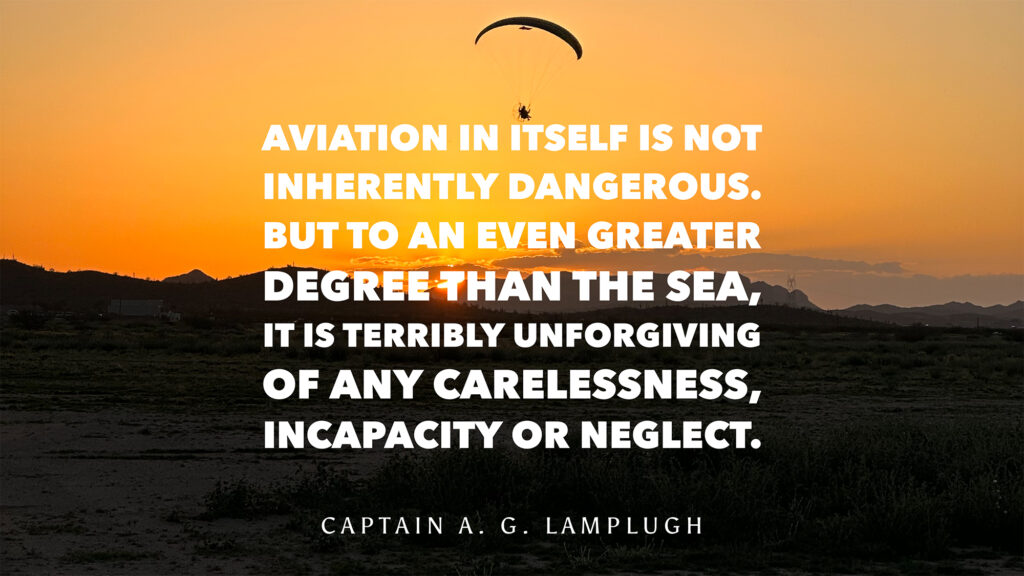Hazardous attitudes

What is the most critical factor in pilot safety? Attitude & Decision-making skills.
“It is estimated that approximately 80 percent of all aviation accidents are related to human factors”
FAA PHAK – Chapter 2
The FAA oversaw an extensive research study on the similarities and dissimilarities between accident-free pilots and those who were not. The project surveyed over 4,000 pilots, half of whom had “clean” records, while the other half had been involved in an accident.
Five traits were discovered in pilots prone to having accidents. These pilots:
- Have disdain toward rules.
- Have very high correlation between accidents on their flying records and safety violations on their driving records.
- Frequently fall into the “thrill and adventure seeking” personality category.
- Are impulsive rather than methodical and disciplined, both in their information gathering and in the speed and selection of actions to be taken.
- Have a disregard for or tend to underutilize outside sources of information.
“Studies have identified five hazardous attitudes that can interfere with the ability to make sound decisions and exercise authority properly: anti-authority, impulsivity, invulnerability, macho, and resignation.”
Anti-Authority
“Rules don’t apply to me.”
“This attitude is found in people who do not like anyone telling them what to do. In a sense, they are saying, “No one can tell me what to do.” They may be resentful of having someone tell them what to do or may regard rules, regulations, and procedures as silly or unnecessary.”
This attitude can be hazardous and fatal. Aside from getting hurt, this attitude can also put LZ’s in jeopardy and get others injured or killed.
The antidote to this attitude is to follow the rules. Please do your best to understand the rules and regulations (FAR 103) and their reasoning. Help your students to understand how the rules and regulations are beneficial to everyone involved in PPG.
Impulsivity
“Screw it…just send it.”
“This is the attitude of people who frequently feel the need to do something, anything, immediately. They do not stop to think about what they are about to do, they do not select the best alternative, and they do the first thing that comes to mind.”
This attitude can get you or your students into trouble when you are rushed and not thinking things through. You see this at fly-ins and gatherings where someone will rush through the launch and run into obstacles or other people. It’s not uncommon to debrief after an incident and see that rushing was involved and taking shortcuts. If you ever feel rushed, slow things down and take a deep breath.
Antidote – Not so fast. Think first.
Invulnerability
“It won’t happen to me.”
“Many people falsely believe that accidents happen to others, but never to them. They know accidents can happen, and they know that anyone can be affected. However, they never really feel or believe that they will be personally involved. Pilots who think this way are more likely to take chances and increase risk.”
There have been several instances where this attitude has led to injury and death. The best way to mitigate this attitude is to progress slowly and methodically. Every pilot should want to grow in their skills but it should be done skillfully.
Antidote – It could happen to me. (“What if it did happen to me?)
Macho/Ego
“I can do it”
“Pilots who are always trying to prove that they are better than anyone else think, “I can do it—I’ll show them.” Pilots with this type of attitude will try to prove themselves by taking risks in order to impress others.”
There is no need to prove anything to anyone. We fly because it’s fun to fly. If flying won’t be fun, maybe due to nasty air or other factors, then we simply shouldn’t fly. A good exercise for countering the macho attitude is to continually ask: “Why am I really doing this?” If it’s being done to prove something or to impress others, ask “Is the risk worth the reward?”
Antidote – Taking chances is foolish.
Resignation
“It wasn’t me.” or “What’s the use?”
“Pilots who think, “What’s the use?” do not see themselves as being able to make a great deal of difference in what happens to them. When things go well, the pilot is apt to think that it is good luck. When things go badly, the pilot may feel that someone is out to get them or attribute it to bad luck.”
Have you ever seen a pilot slightly botch a landing…then say something like: “I think I hit ‘sink’ just as I was landing.”? This is a form of resignation. Of course, it had to be ANY other factor but themselves. Empower your students by teaching them to take ownership of their flying skills and knowledge.
Antidote – I’m not helpless. I can make a difference.
I can always improve my skills and knowledge.
